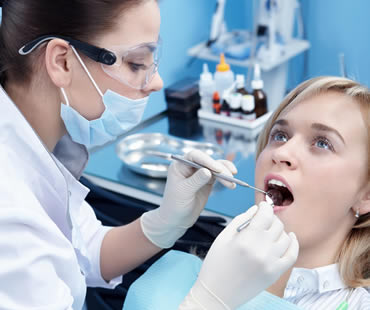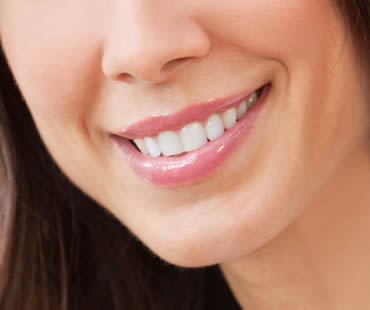
Does your smile need some work? Are you sensitive about your teeth and how you may look while you eat or drink? Does speaking in public leave you anxious because you’re worried about the appearance of your teeth? Have you been putting off talking to a cosmetic dentist because you’re worried about the dental therapies you might need? Don’t be afraid of a smile makeover! A smile makeover can be a simple thing, as minor and fast as teeth whitening, a process that can often be completed in-office in a single visit.
If you are looking for solutions to your smile problems, begin by finding a skilled cosmetic dentist. You want to be sure to see photographs of some of the actual work done by a particular cosmetic dentist. Don’t assume that what you see online are actual patient photographs – they may be someone’s patients, but if they weren’t this dentist’s patients, you’re not getting any closer to identifying the right cosmetic dentist for you.
Ask around for private recommendations from friends and family; it might surprise you how many people you know have had work done to their smiles. You might assume that your coworker’s smile is all natural, only to learn it’s the result of a skilled cosmetic dentist and veneer work done so carefully and well that they look just like natural teeth.
Dental veneers can transform your smile in only a few visits. Good veneers will be made of materials that mimic the color and translucency of natural teeth. They won’t look puffy, too long or artificial and will complement your hair and skin color. Orthodontia can change the alignment of your teeth, with choices such as Invisalign to help you feel more confident as you change your smile.
A smile makeover can benefit you in so many ways by simply boosting your self-confidence. After you complete your treatment, you will be surprised at how much better you feel about yourself and about life in general. You will face the day with confidence, knowing you can live your life without worry about your smile.
Dr. Drain is a cosmetic dentist in Sicklerville offering smile makeovers.

Using mouthwash is not a replacement for brushing and flossing, but instead is an addition to your oral care routine that can help you maintain healthy teeth and gums. If you’ve visited the mouthwash aisle at your local drugstore lately, you’ve seen that there is a giant selection of brands and types to choose from. It can be a bit overwhelming if you don’t know what purpose each one serves. Here is a description of the most common types of mouthwashes to help you choose.
Antiseptic
The goal of antiseptic mouthwash is to kill germs and bacteria in your mouth. It can also combat gum disease and persistent bad breath. Most dentists recommend that you discuss using antiseptic mouthwash with them before selecting this type, because they can help you decide if it’s needed for you. It can impact your sense of taste and can stain your teeth, so you want to be sure it’s helpful for you before using it.
Fluoride
The most common kind of mouthwash is fluoride, which utilizes the natural abilities of this mineral to strengthen your tooth enamel and prevent tooth decay and cavities.
Cosmetic
Designed to disguise bad breath, or halitosis, cosmetic mouthwash does not offer protection from problems like tooth decay. It can help keep your teeth clean and help rinse away food particles, but it is mainly for freshening your breath.
Combination
Mouthwash that combines purposes of the product is called combination mouthwash. It is meant to prevent tooth decay, maintain your oral health, and freshen your breath.
Prescription
Sometimes a prescription mouthwash is warranted for patients with gum disease or other types of decay. See your dentist to find out it this type of mouthwash would benefit you.
If you live in the Sicklerville area and you need a general dentist, contact us today.

Whether you call it pop, soda, soft drink, or something else, these terms all refer to a sugary, carbonated drink popular all over the country. It is estimated that Americans consume over 13 billion gallons of soft drinks each year. These beverages can cause serious health problems, including negative effects on your oral health.
Soft drinks are one of the most significant reasons for tooth decay, and it impacts all age groups. From babies drinking it out of bottles to teenagers drinking it all day long to older adults sipping it in retirement homes, it is deteriorating tooth enamel and eroding gums of everyone who consumes it.
Why are soft drinks harmful?
The high sugar content in the drinks is the root cause of trouble, and the high acid content adds to the threat. The sugar combines with bacteria in your mouth to create an acid, which adds to the acid from the drink itself. Then this mixture attacks your teeth. Each time you take a drink of the carbonated beverage, an acid attack begins in your mouth. During this time, your tooth enamel is weakened and cavities are just waiting to form. You may think that the risk goes away by drinking sugar-free soft drinks. Although these are less harmful, they are still acidic and can lead to decay.
How can I avoid harming my teeth?
The ideal way to rule out risks from soft drinks is to cut them out of your diet completely. If you think you just can’t live without them, here are some suggestions:
- Drink more water.
- Set a good example. Drink alternatives yourself and encourage your kids to do the same.
- Sip with straws. This helps keep the sugar from direct contact with your teeth.
- Rinse with water. After drinking a soda, rinse your mouth with water to reduce the amount of sugar and acid hanging onto your teeth and gums.
- Use fluoride toothpaste and mouth rinse. Using fluoride in your daily dental routine helps to reduce decay and strengthen enamel. Also ask your dentist about the possible need for professional fluoride treatments.
General dentist in Sicklerville – Schedule your appointment today.

At least twice a year, you need to schedule an appointment with your dentist. These visits allow your dentist to assess you oral health, address any concerns you have, and look for signs of problems. Protecting your teeth and gums is a partnership between you and your dentist. For the best results, follow these helpful hints:
Find the right dentist in Sicklerville
Selecting a provider and dental office that fits your personality will make you more likely to keep your appointments.
Provide an accurate health history
Although your dentist’s primary concern is your mouth, overall wellness can impact your dental health. For example, chronic health issues like diabetes and HIV can increase your risk for gum disease.
Bring a list of current medications
Your dentist needs to know the names and dosages of any medicine you take regularly. Certain medications, such as pain relievers, allergy medicines, and anti-depressants, can cause dry mouth, which may make you susceptible to dental problems.
Report any issues right away
Sometimes, you may develop a toothache or notice bleeding gums between your visits. Don’t ignore these symptoms because they may indicate bigger problems. The longer you wait to address any issues, the more time and money you will lose.
Share your fears
For some people, dental visits cause anxiety or fear. Let your dentist know exactly what worries you. Most doctors want you to feel relaxed and comfortable, so they will take time to answer your questions and help you feel at ease.
Our dental office is located in Sicklerville
A beautifully white smile is often perceived as a sign of youth and vitality, but over time it can gradually fade. Eating certain foods or drinking dark-colored beverages, taking particular medications and simply aging can all take its toll on your teeth. It’s hardly surprising that tooth whitening has become one of the most popular cosmetic dental procedures in recent years. Professional teeth whitening is safe and effective and can quickly rejuvenate your smile. If you’re thinking about whitening your teeth, there are several options to choose from which include:
In-Office Whitening
In-office teeth whitening is hugely popular, as you can literally book a lunch time appointment and leave with a dazzling white smile. Surface stains can quickly be eliminated, and teeth can be brightened by up to eight shades in just an hour. This option is the most expensive, and you don’t have much control over the final results. Your dentist in Sicklerville will activate the bleaching gel with a special light so the final result should be a stunning white smile.
Custom-Made Take-Home Teeth Whitening Kits
Not everyone wants to whiten their teeth so quickly, and custom-made whitening trays enable you to safely bleach teeth in a more controlled manner. Your Sicklerville cosmetic dentist will take impressions of your teeth that are used to fabricate custom-made whitening trays. You’ll be shown how to use these trays, and should wear them for as long as directed. Most people will begin to notice real results within a few days, but they generally need to be used for two or three weeks to achieve optimum effects.
Over-The-Counter Teeth Whitening Kits
Over-the-counter whitening kits come in the form of trays and whitening strips and can cost between $20 and $50 so it’s tempting to think they will save you money. However the bleaching gels contained in these kits are not as strong as those available to your dentist. In addition, there’s the possibility these kits could irritate your gums as ill-fitting whitening trays can allow the gel to leak out.
If you live in the Sicklerville area contact us today

Having a bright, beautiful, white smile is something we all desire. It signals health and prosperity and leaves the best possible first impression a person can make. There are a host of products at the drug store that label themselves “whitening.” Whitening toothpastes, whitening mouth rinses, whitening strips, gels and creams all line the shelves, promising a “new you!” Your dentist, however, offers something labeled as “bleaching.” So what’s the difference? Which should you choose?
Your natural tooth is made up of two specific layers: enamel and dentin. The enamel layer is on the outside of the tooth. It’s the white part we see when someone smiles. It’s hard and heavily mineralized and can appear like porcelain. The dentin is the inner layer. It’s yellow in color and supports the enamel on the outside. Over time, your enamel naturally wears away and the yellow dentin color can begin to show through.
The term “whitening” is applied to any product that helps restore teeth to a natural color by removing debris and stains from a natural tooth’s surface. Any substance that restores the surface of a tooth’s enamel is a whitening product. Many whitening products contain a mild abrasive that removes leftover discoloration and food particles, leaving the enamel of the tooth smooth and white. Teeth whitening products combat stains caused by ageing and the discoloration left by many foods, or by smoking.
The FDA permits the term “bleaching” only for products that can whiten a tooth beyond their initial, natural color. Bleaching products contain active ingredients such as carbamide peroxide or hydrogen peroxide. The peroxide is activated so that it releases oxygen molecules that enter the tooth enamel and break down stains in a way that whitening products cannot. This activation can occur immediately, in the case of some in-office bleaching products, like laser whitening, or it can take several hours, as it can with custom take-home bleaching trays.
If you are considering brightening your smile, talk to Sicklerville teeth whitening dentist Dr. Drain to see what product is best suited to your smile needs!
We treat patients from Sicklerville and the surrounding area











